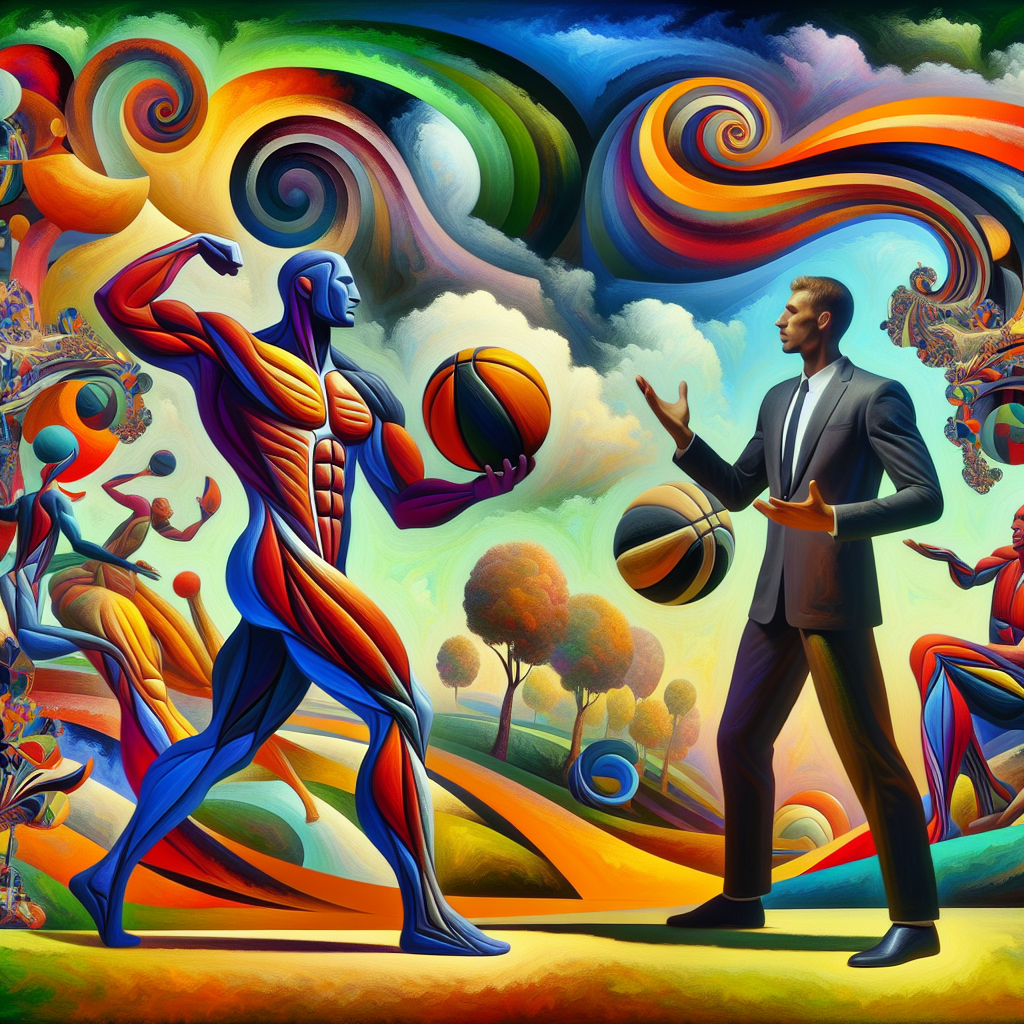Kenyon Martin: LeBron James should’ve responded stronger to Ime Udoka calling Lakers b*tches

LeBron James’ Missed Opportunity: A Stronger Response to Ime Udoka’s Provocation
Kenyon Martin, a former NBA player known for his tenacity and outspoken nature, recently commented on an incident involving LeBron James and Ime Udoka. During a heated game, Udoka, the head coach of the Boston Celtics, reportedly called the Los Angeles Lakers “b*tches,” a provocation that did not elicit a strong response from LeBron James. Martin believes that James, as the leader of the Lakers and one of the most influential figures in the NBA, should have responded more forcefully to Udoka’s derogatory remarks.
In the high-stakes world of professional basketball, verbal exchanges and psychological tactics are not uncommon. However, the context and the individuals involved in this particular incident add layers of complexity. LeBron James, a four-time NBA champion and widely regarded as one of the greatest basketball players of all time, has built a reputation not only for his on-court prowess but also for his leadership and composure. Ime Udoka, on the other hand, is a relatively new head coach who has quickly made a name for himself with his strategic acumen and fiery demeanor.
Kenyon Martin’s assertion that James should have responded more assertively stems from a belief in the importance of defending one’s team and maintaining respect. In Martin’s view, allowing such a comment to go unchallenged could be perceived as a sign of weakness, potentially emboldening opponents and undermining team morale. Martin’s perspective is shaped by his own experiences in the NBA, where he was known for his physical style of play and willingness to stand up to any challenge.
While Martin’s viewpoint is understandable, it is also important to consider the broader implications of James’ response, or lack thereof. LeBron James has often taken a measured approach to conflict, choosing to focus on his performance and let his actions speak louder than words. This strategy has served him well throughout his career, allowing him to maintain a level of professionalism and avoid unnecessary distractions. By not engaging in a verbal altercation with Udoka, James may have been attempting to keep the focus on the game and avoid escalating the situation.
Moreover, James’ decision not to respond aggressively could be seen as a reflection of his leadership style. As the face of the Lakers and a role model for many young athletes, James has a responsibility to set a positive example. Engaging in a public confrontation might have sent the wrong message, suggesting that retaliation is an appropriate response to provocation. Instead, James’ restraint could be interpreted as an effort to rise above the fray and demonstrate the importance of maintaining composure under pressure.
In conclusion, while Kenyon Martin’s call for a stronger response from LeBron James is rooted in a desire to see the Lakers defend their honor, it is also essential to recognize the nuances of James’ approach. By choosing not to engage in a verbal battle with Ime Udoka, James may have been prioritizing the long-term interests of his team and his own legacy. Ultimately, the incident highlights the delicate balance that athletes must strike between standing up for themselves and maintaining their professionalism. As the NBA continues to evolve, the ways in which players navigate these challenges will undoubtedly remain a topic of discussion and debate.
Kenyon Martin’s Take: Why LeBron James Should Have Confronted Ime Udoka’s Comments

Kenyon Martin, a former NBA player known for his tenacity and outspoken nature, recently made headlines with his comments regarding an incident involving LeBron James and Ime Udoka. During a heated game, Udoka, the head coach of the Boston Celtics, reportedly referred to the Los Angeles Lakers as “b*tches.” This derogatory remark did not sit well with Martin, who believes that LeBron James, as the leader of the Lakers, should have responded more assertively to defend his team’s honor.
Martin’s perspective is rooted in the belief that leadership in sports extends beyond physical prowess and strategic acumen; it also encompasses the ability to stand up for one’s team in the face of disrespect. According to Martin, James, who is widely regarded as one of the greatest basketball players of all time, missed an opportunity to set a precedent for how his team should be treated. By not addressing Udoka’s comments more forcefully, Martin argues, James inadvertently allowed a narrative of disrespect to persist.
Transitioning to the broader implications of such incidents, it is essential to consider the role of leadership in professional sports. Leaders like LeBron James are not only responsible for their performance on the court but also for the morale and unity of their team. When a figure of authority, such as a head coach, makes disparaging remarks, it can have a ripple effect on the team’s cohesion and self-esteem. Martin’s critique suggests that a stronger response from James could have served as a rallying point for the Lakers, reinforcing their solidarity and resilience.
Furthermore, Martin’s comments highlight the importance of respect in professional sports. The NBA, like any other professional league, operates on a foundation of mutual respect among players, coaches, and officials. Disrespectful comments, especially those made publicly, can undermine this foundation and lead to a toxic environment. By addressing such issues head-on, leaders can help maintain the integrity and sportsmanship that are crucial to the game’s spirit.
In addition to the immediate impact on team dynamics, Martin’s viewpoint also touches on the long-term legacy of players like LeBron James. Throughout his career, James has been a role model for many, both on and off the court. His actions and reactions are scrutinized and often emulated by younger players and fans. By taking a firmer stand against Udoka’s comments, James could have reinforced the importance of standing up against disrespect, thereby setting a positive example for future generations.
Moreover, it is worth considering the psychological aspect of such confrontations. Athletes, like all individuals, are influenced by their environment and the behavior of those around them. A leader’s response to adversity can significantly impact the team’s mental toughness and confidence. Martin’s assertion implies that a more robust reaction from James could have bolstered the Lakers’ mental fortitude, preparing them better for future challenges.
In conclusion, Kenyon Martin’s critique of LeBron James’ response to Ime Udoka’s derogatory comments underscores the multifaceted nature of leadership in professional sports. It emphasizes the need for leaders to defend their team’s honor, maintain respect within the league, and set a positive example for others. While James’ legacy as a player is undoubtedly secure, Martin’s perspective offers valuable insights into the broader responsibilities that come with being a leader in the world of sports.
The Importance of Leadership: LeBron James and Handling Public Criticism
In the realm of professional sports, leadership is often scrutinized under the public eye, and athletes are expected to navigate a myriad of challenges both on and off the court. Recently, former NBA player Kenyon Martin expressed his opinion that LeBron James, a figure synonymous with leadership in basketball, should have responded more assertively to Ime Udoka’s derogatory comments about the Los Angeles Lakers. This incident brings to light the intricate dynamics of leadership and the handling of public criticism, particularly for someone of LeBron James’ stature.
LeBron James, often hailed as one of the greatest basketball players of all time, has consistently demonstrated exceptional leadership qualities throughout his career. His ability to inspire teammates, maintain composure under pressure, and advocate for social justice issues has solidified his reputation as a leader both on and off the court. However, leadership is multifaceted, and the way one responds to public criticism is a critical aspect of it. Kenyon Martin’s assertion that LeBron should have responded more forcefully to Udoka’s comments suggests a belief that a stronger stance would have better exemplified leadership.
Public criticism, especially in the high-stakes world of professional sports, can be a double-edged sword. On one hand, it can serve as a catalyst for improvement and resilience. On the other hand, it can undermine confidence and unity if not addressed appropriately. LeBron James’ approach to handling such situations has often been characterized by a measured and composed demeanor. This strategy aligns with the philosophy that maintaining focus on the game and not getting entangled in verbal altercations is paramount. However, Martin’s perspective introduces an alternative viewpoint that sometimes, a more vigorous response is necessary to defend one’s team and assert dominance.
Transitioning to the broader implications of this discussion, it is essential to consider the context in which leaders operate. The NBA is not just a sports league; it is a global platform where actions and words are magnified. Leaders like LeBron James are constantly balancing the expectations of fans, media, and their peers. In this environment, every response is scrutinized, and the pressure to act in a manner that upholds one’s reputation and the team’s morale is immense. Therefore, the decision on how to respond to criticism is not merely about personal pride but also about strategic leadership.
Moreover, the nature of leadership in sports extends beyond the immediate reactions to criticism. It encompasses the ability to foster a culture of respect, resilience, and unity within the team. LeBron James’ leadership style, which often emphasizes leading by example and maintaining a calm demeanor, has been instrumental in his success. However, Kenyon Martin’s comments highlight that there are moments when a more vocal and assertive response might be necessary to reinforce the team’s strength and solidarity.
In conclusion, the debate over how LeBron James should have responded to Ime Udoka’s comments underscores the complexity of leadership in professional sports. While LeBron’s composed approach has its merits, Kenyon Martin’s call for a stronger response suggests that there are times when assertiveness is equally important. Ultimately, the essence of leadership lies in the ability to adapt and respond to different situations in a manner that best serves the team’s interests. As LeBron James continues to navigate his illustrious career, his handling of public criticism will remain a testament to his evolving leadership style.

